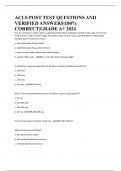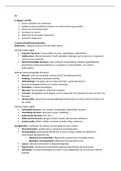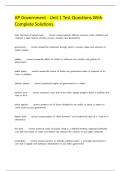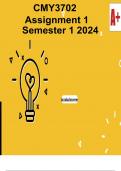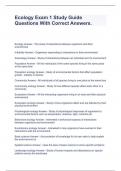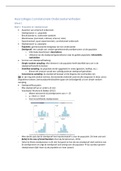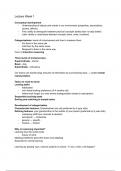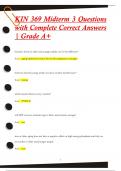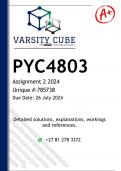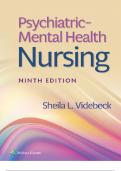VERIFIED ANSWERS|100%
CORRECT|GRADE A+ 2024
You are caring for a patient with a suspected stroke whose symptoms started 2 hours ago. The CT was
normal with no sign of hemorrhage. The patient does not have any contraindications to fibrinolytic
therapy. Which treatment is best?
a. start fibrinolytic therapy ASAP
b. hold fibrinolytic therapy for 24 hours
c. order an echo before fibrinolytic administration
d. wait for MRI result - ANSWER a. start fibrinolytic therapy ASAP
For STEMI pt, maximum goal time for ED door-to-balloon-inflation time for PCI?
a. 150 mins
b. 180 mins
c. 120 mins
d. 90 mins - ANSWER 90 mins
Which is the recommended oral dose of ASA for a pt w/ suspected ACS?
a. 81 mg
b. 325-650 mg
c. 160-325 mg
d. 40 mg - ANSWER 160-325 mg
chest compressions during for adult rate - ANSWER 100-120/min
effect of excessive ventilation
a. decresed cardiac output
b. decreased intrathoracic pressure
c. increased perfusion pressure
, d. increased venous return - ANSWER decreased cardiac output
temperature to achieve targeted temperature management after cardiac arrest - ANSWER 32-36C
3 mins into cardiac arrest resuscitation attempt, one member of your team inserts an endotracheal tube
while another performs chest compressions. Capnography shows a persistent waveform & a PETCO2 of
8mmHg. What is the significance of the finding?
a. chest compression may not be effective
b. The endotrachael tube is in the esophagus
c. the team is ventilating the patient too often
d. the patient meets the criteria for termination of efforts - ANSWER a. chest compression may not be
effective
Your patient is in cardiac arrest and has been intubated. to assess CPR quality, you should - ANSWER
monitor the patient's PETCO2
In addition to clinical assessment, which is the most reliable method to confirm & monitor correct
placement of an endotracheal tube? - ANSWER continous waveform capnography
A 45M had coronary artery stents placed 2 days ago. Today he is in severe distress and reporting
"crushing" chest discomfort. He is pale, diphoretic, and cool to the touch. His radial pulse is very weak,
blood pressure is 64/40, respiratory is 28 bpm/min and O2 set is 89% on room air. - ANSWER answer has
to do with acute coronary syndrome
A 45M had coronary artery stents placed 2 days ago. Today he is in severe distress and reporting
"crushing" chest discomfort. He is pale, diphoretic, and cool to the touch. His radial pulse is very weak,
blood pressure is 64/40, respiratory is 28 bpm/min and O2 set is 89% on room air. When applied, the
cardiac monitor initially showed ventricular tachycardia, which then quickly changed to ventricular
fibrillation. What do we do?
a. chest compression
b. vasoactive meds
c. vascular access
d. advanced airway - ANSWER a. chest compression

